COMPARISONS of LANGUAGES INVOLVED
in the translation of the MAALAN AARUM |
| INTRODUCTION |
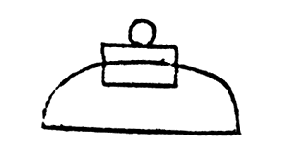
3.1 |
|

3:2 |
They lived where it snowed.
They lived where it stormed.
They lived where it was always winter. |

3:3 |
While still in their cold land
They remembered longingly
the mild weather,
the many deer,
and also foxes |
| HUNTERS GO EVERYWHERE |
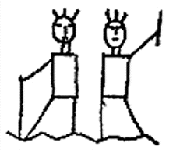
3:4 |
The poor, lonely, but tough men
became hunters and
left those living
in strong houses.
|

3:5 |
Separated from home
like breasts on the same body
the hunters became tougher
extremely good and
they reached for the sky. |
| Maalan Aarum |
Algonquin |
Old Norse |
eluwi-chitanesit
Eluwitakauwesit
elowichiksit
elowichick
del sinewo |
ei-ow tschitennessin
ei-ow tokchooaesit
eluwiwuliksit
ei-ow chekee
poh (dulheu) shinau |
eiga standadha
eiga taa-skyya sit
(eiga) allr fraegi sit
eiga sterkr
dair (sin aa)
|
 |
|
 |
the stongest
the most united
the purest
were the hunters
? no recorded words? |

original English
translation

translation
of Old Norse |
he hardened
he (reached) to the sky
(he was) extremely good
he had (violent) strength
breast (separate like) |
WORD (PHRASE) BY WORD (PHRASE) DECIPHERMENT
(All references are to Sherwin’s eight volumes of the Viking and the Red Man) |
| Original English |
the strongest |
|
| Recorded sounds |
eluwi- chitanesit |
1* |
| Algonquin words |
ei-ow tschitennessin |
v. 1 p. 45 & v. 6 p. 135 |
| Old Norse |
eiga standadha |
2* |
| Norse/English |
he has hardened |
|
| |
|
|
| Original English |
the most united |
|
| Recorded sounds |
Eluwi tak auwe sit |
1* |
| Algonquin words |
ei-ow tok chooae sit |
v. 1 p. 45 & v. 1 p. 203 |
| Old Norse |
eiga taa-skyya sit |
3* |
| Norse/English |
he (reaches) to the sky |
|
| |
|
|
| Original English |
the purest |
|
| Recorded sounds |
Elowi chik sit |
1* |
| Algonquin words |
eluwi wulik sit |
v. 1 p. 45 & v. 6 p. 27 |
| Old Norse |
(eiga) allr fraegi sit |
4* |
| Norse/English |
(he became) extremely good |
|
| |
|
|
| Original English |
Were the hunters |
|
| Recorded sounds |
elowi chick |
1* |
| Algonquin words |
ei-ow chekee |
v. 1 p. 45 & v. 5 p. 25 |
| Old Norse |
eiga sterkr |
|
| Norse/English |
he had (violent) strength |
5* |
| |
|
|
| Original English |
? no recorded words? |
|
| Recorded sounds |
del sinewo |
|
| Algonquin words |
(poh) dulheu (shinau) |
v. 6, p. 102 & v. 7 p. 18 |
| Old Norse |
dair sin aa?) |
6* |
| Norse/English |
breast (separate like) |
|
| back to top |
| Notes |
| 1* Howe, a translator, wrote: “Eiow (possessive), He has it.” Sherwin wrote, “Old Norse ‘eiga’ is pronounced very much like the English ‘aya.’” |
| 2* See Chintanes-sin in Walam Olum Chap. 3 verse 4. |
3* “Sit” is the Old Norse reflexive pronoun used to indicate the person who receives the benefits. The correct use of the reflexive pronouns “sin,” “sit,” and “sik” through out the Maalan Aarum is very strong evidence the original creators were speaking Old Norse. |
4* The Old Norse owrd “allr”, compared to the surrounding “eluwi” words and the syllables “eluwi” in the Algonquin phrase implies that the Old Norse phrase “eiga fraegi sit” may have started as “He was good” and then became an idiom meaning he was “extremely good.” The latter meaning may have been in use when the Maalan Aarumwas created.
Even today in some Indian communities of Oklahoma the highest praise, in English, rarely given to a white face is “You done good.”
Sherwin, who may have not have known the idiom, may have attempted to choose literal Old Norse words to fit the meaning of idiom and selected “allr.” |
5* The original English and the Old Norse English differ on this verse. Maybe the Historian knew the correct concept of violent strength but had difficulty explaining it to the Recorder. Perhaps both knew the word as an idiom for hunters. Hunters are often violently strong. |
6* This Maalan Aarum word seems out of place with the description of the hunters in the rest of the verse. An early Memorizer or the Historian may have added this word as an afterthought because he may have been concerned that the concept of separating had not stressed enough in translation of the previous verse.
“Dair.” an Icelandic word, meant, “breast.” “Dulheu,” came from the Lenape tribes who may have migrated from Greenland. “Pohsinau,” an east coast Algonquin word, meant “breast” and also “divided like breasts.”
Sherwin proposed that “pohsinau” morphed from Old Norse “bresta,” but the transition is difficult to believe in this case. “Poh” more likely morphed from the original Icelandic “dair,” which may have also morphed into the modern Norwegian “parre,” which may be an earlier word for the English “pair.”
“Dair sin aa,” which might have been an idiom meaning, “divided like my breasts they went away.” The idiom may be closer to the original meaning of the Walam Olum word. The Historian is likely to have known the idiom, but the Recorder may have learned only the literal meaning (“breasts”) for “Dair” and could not understand the Historian’s hand gestures for “separate like breasts.”
Either way, if the Recorder wrote down “breasts” or “separate like breasts,” the Editor probably scratched the English translation out because the word(s) looked out of context. |
| back to top |
|

3:6 |
The hunters camped
in the north, east,
south and west. |
| CHRIST TRUMPS ODIN |
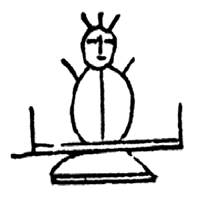
3.7 |
The man, who ruled
in that old, northern land
that they all left,
was baptized to be pure. |
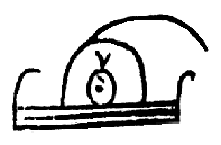
3.8 |
The discouraged people
were worried about
worn out land
they had to abandon.
The priest said,
"We decent people
should go somewhere else."
|
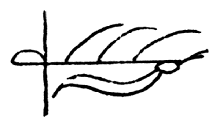
3.9 |
The common people
in the east stole away
the brothers
abandoned all
with great discouragement
and again discouragement |

3.10 |
In a short while
the weeping, weak, dirty.
needy (people from)
the burnt land
saved themselves and
rested on the other side |

3.11 |
After moving down
from the snowy land
and discreetly leaving
the cousins separated
through out all the land |
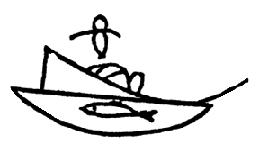
3.12 |
Where there was little
pack ice in heaped ice
with a lot of snow drifts,
the white geese ruled
and the white bear ruled |
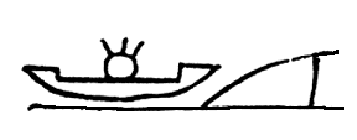
3.13 |
Floating up the streams
in their canoes,
our fathers were rich.
They were in the light
when they were at these Islands. |
| THE DECISION |

3.14 |
"Head Beaver and Big Bird
said 'Let us go to Akomen'" |
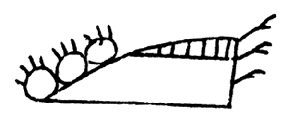
3.15 |
All say they will go along,
All who are free to go. |
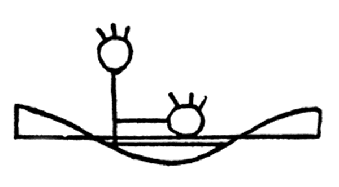
3.16
|
Those of the north agreed.
Those of the east agreed.
Over the waters
Over the frozen sea
They went to enjoy it |
| THE MIGRATION |

3.17 |
On the wonderful slippery water,
On the stone hard water, all went
On the great tidal sea,
Over the [puckered pack ice] |
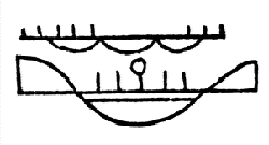
3.18
|
[I tell you it was a big mob]
In the darkness,
all in one darkness
To Akomen, to the [west],
In the darkness
They walk and walk,
all of them |
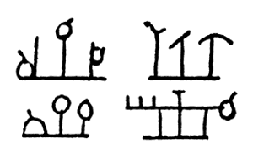
3.19 |
The men from the north,
the east, the south,
The eagle clan, the beaver clan
the wolf clan,
The best men, the rich men,
the head men
Those with wives,
Those with daughters,
Those with dogs |

3.20 |
They all come.
They tarry at the land
Of the spruce pines,
Those from the east
Some with hesitation.
Esteeming highly their
Old home at the mound land |



















